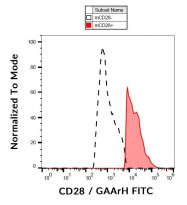ARG62796
anti-CD28 antibody [37.51] (Functional Grade)
anti-CD28 antibody [37.51] (Functional Grade) for CyTOF®-candidate,Flow cytometry,Functional study,ICC/IF,IHC-Frozen sections,Immunoprecipitation and Mouse
Developmental Biology antibody; Immune System antibody; Cytotoxic T Cell Surface Study antibody
Overview
| Product Description | Functional grade and low endotoxin Hamster Monoclonal antibody [37.51] recognizes CD28 |
|---|---|
| Tested Reactivity | Ms |
| Tested Application | CyTOF®-candidate, FACS, FuncSt, ICC/IF, IHC-Fr, IP |
| Specificity | The clone 37.51 reacts with extracellular domain of mouse CD28 costimulatory receptor, a 45 kDa homodimeric protein expressed by thymocytes, mature T cells and NK cells. |
| Host | Hamster |
| Clonality | Monoclonal |
| Clone | 37.51 |
| Isotype | IgG |
| Target Name | CD28 |
| Antigen Species | Mouse |
| Immunogen | Mouse T cell lymphoma EL-4 cells |
| Conjugation | Un-conjugated |
| Alternate Names | Tp44; TP44; T-cell-specific surface glycoprotein CD28; CD antigen CD28 |
Application Instructions
| Application Suggestion |
|
||||||||||||||
|---|---|---|---|---|---|---|---|---|---|---|---|---|---|---|---|
| Application Note | Functional studies: In vitro and in vivo T cell costimulation. * The dilutions indicate recommended starting dilutions and the optimal dilutions or concentrations should be determined by the scientist. |
Properties
| Form | Liquid |
|---|---|
| Purification | Purification with Protein G. |
| Purification Note | 0.2 µm filter sterilized. Endotoxin level is <0.01 EU/µg of the protein, as determined by the LAL test. |
| Purity | > 95% (by SDS-PAGE) |
| Buffer | PBS (pH 7.4) |
| Concentration | 1 mg/ml |
| Storage Instruction | For continuous use, store undiluted antibody at 2-8°C for up to a week. For long-term storage, aliquot and store at -20°C or below. Storage in frost free freezers is not recommended. Avoid repeated freeze/thaw cycles. Suggest spin the vial prior to opening. The antibody solution should be gently mixed before use. |
| Note | For laboratory research only, not for drug, diagnostic or other use. |
Bioinformation
| Database Links |
Swiss-port # P31041 Mouse T-cell-specific surface glycoprotein CD28 |
|---|---|
| Gene Symbol | Cd28 |
| Gene Full Name | CD28 antigen |
| Background | CD28 is the critical T cell costimulatory receptor which provides to the cell the important second activation signal by binding CD80 and CD86 that are expressed by antigen presenting cells. Besides its costimulation role CD28 functions in preventing T cells from anergic hyporesponsive state or from undergoing premature apoptotic cell death. In murine peripheral lymphoid organs and in the blood, all CD4+ and CD8+ T cells express CD28. In the thymus, CD28 expression is highest on immature CD3-, CD8+ and CD4+8+ cells, and on CD4-8- cells that express alpha/beta and gamma/delta TCR. The level of CD28 on mature CD4+ and CD8+ alpha/beta TCR+ thymocytes is two- to fourfold lower than on the immature cells. |
| Function | Involved in T-cell activation, the induction of cell proliferation and cytokine production and promotion of T-cell survival. [UniProt] |
| Highlight | Related products: CD28 antibodies; CD28 ELISA Kits; CD28 Duos / Panels; Anti-Hamster IgG secondary antibodies; Related news: CyTOF-candidate Antibodies |
| Research Area | Developmental Biology antibody; Immune System antibody; Cytotoxic T Cell Surface Study antibody |
| Calculated MW | 25 kDa |
| PTM | CD40LG induces tyrosine phosphorylation of isoform 3. |
Images (1) Click the Picture to Zoom In
Clone References








